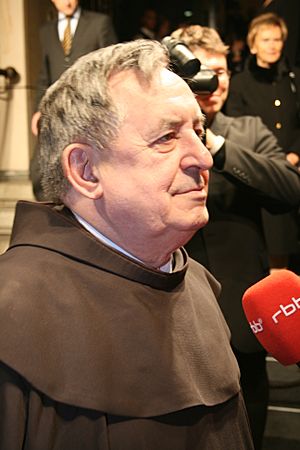Eckart Höfling facts for kids
Eckart Höfling (born October 28, 1936 – died March 1, 2014) was a Catholic priest from Germany. He dedicated his life to helping people in Brazil who were living in poverty. He worked hard to improve their lives and provide them with important support.
Contents
Who Was Eckart Höfling?
Eckart Höfling was born in a place called Langenprozelten in Germany. He finished school in Würzburg in 1949. After that, he worked in Karlstadt for a few years.
Early Life and Becoming a Priest
In 1957, Eckart Höfling decided to join the Franciscan Order. This is a group of Catholic priests and brothers who follow the teachings of Saint Francis of Assisi. They often focus on helping the poor.
He first traveled to Brazil in 1959. There, he studied philosophy and theology. On December 10, 1966, he became a priest. After his ordination, he was sent back to Brazil to lead two church communities.
Helping People in Brazil
Eckart Höfling spent many years creating important social programs in Brazil. His main goal was to help families and children living in very poor areas.
Bringing Hope to Favelas
In 1977, he started a big network of social services in Rio de Janeiro. He set up special centers in areas called favelas. These are neighborhoods where many people live in simple homes and often face challenges.
His centers, located in Vila Ideal and Prainha, offered regular medical care. They also provided other important support for the people living there. Later, in 1986, he also created a similar social network in São Paulo.
How His Projects Were Funded
The money for these important projects came from Germany. Over 30 years, the Georg Ludwig Rexroth-Stiftung, a German foundation, gave over 2 million Euros. This funding helped Father Höfling continue his work. In 1987, he became the director of the Franciscan Social Services Network in Rio de Janeiro.
Awards for His Great Work
Eckart Höfling's dedication and hard work were recognized with important awards. In 2007, he received the German Federal Cross of Merit. This is a high honor given by the German government.
The next year, in 2008, he was given the Quadriga Award. This award celebrates people who are pioneers and role models. Both awards showed how much his efforts to fight poverty in Brazil were appreciated.
 | Janet Taylor Pickett |
 | Synthia Saint James |
 | Howardena Pindell |
 | Faith Ringgold |


